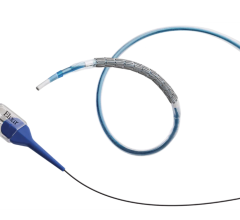The FDA panel that convened for an intense, two-day review of drug-eluting stents last week heard key testimony from clinical experts at both Boston Scientific Corp. and Cordis Corp., the only two interventional device manufacturers in the U.S. that have FDA clearance to market the devices. The panel concluded that, for on-label indications, DES appear to increase the risk of late stent thrombosis but do not increase the risk of death or MI.
On Dec. 7 Dr. Donald S. Baim, chief medical and scientific officer for Boston Scientific, presented data on the company’s 7,000- patient ARRIVE I and II registries of real-world patients -- including those with complex. The data showed that the TAXUS paclitaxel-eluting coronary stent provides substantial benefits in keeping arteries open and avoiding repeat procedures for patients with complex coronary artery disease, at no higher risk than alternative cardiovascular treatments.
Dr. Baim also outlined data on Boston Scientific's long-term randomized clinical trials in 2,797 patients with somewhat less complex lesions. That data showed that the TAXUS stent is as safe as bare-metal stents and far more effective in reducing the need for repeat procedures.
Patients enrolled in the ARRIVE registries tended to present much more complex situations involving very small, very long or multiple vessel blockages that often required multiple stents. These patients represent up to two-thirds of the patients who receive TAXUS stents in the real-world practice of interventional cardiologists.
The data presented by Dr. Baim showed that patients in the ARRIVE registries with simple blockages had comparable outcomes to those with similar lesions in the TAXUS clinical trials, confirming the ability of these registries to accurately track clinical outcomes, the company stated in a release. As expected, patients with complex coronary artery disease had slightly higher adverse events compared to the randomized trials and the simpler cases in the ARRIVE registries. However, the rates of death and heart attack were equivalent or better than those for potential alternative treatments such as bypass surgery. The data on complex cases were also consistent with other real-world registries of drug-eluting stents using either the TAXUS or CYPHER stent. These registries showed trends towards lower rates of death, heart attack, and repeat procedures for TAXUS stents compared to CYPHER stents, in patients with diabetes mellitus.
Boston Scientific says enrollment is approaching completion in two additional landmark randomized trials comparing the TAXUS stent to bare-metal stents in patients with acute heart attacks and comparing the TAXUS stent to bypass surgery in the most complex patients with narrowing of the left main coronary artery and/or narrowing of all three coronary arteries.
CORDIS HEARD AT FDA MEETING
Spokespersons for Cordis, also during the first day of the FDA meeting, indicated that analysis of research on the CYPHER sirolimus-eluting coronary stent suggests a need for additional education on anti-platelet therapy regimens for bare-metal and drug-eluting stent patients and further research to understand safety factors.
In addition, Cordis reaffirmed its commitment to support efforts by the clinical community, medical societies and industry to achieve these goals. The company ' s conclusions are based on an independent analysis of long-term clinical data for the CYPHER Stent conducted and presented by the Harvard Clinical Research Institute — it confirmed that the safety and clinical benefits of the CYPHER Stent extend out to four years, the company states. The data, based on four randomized controlled clinical trials, suggested that there was no significant difference in the incidence of thrombosis between the CYPHER Stent and bare-metal stents.
"We are actively engaged in a global, multi-faceted approach that includes clinical evidence and education to serve patients and the doctors that treat them," said Campbell Rogers, M.D., chief technology officer, Cordis Corp. "Cordis will continue to work with the medical community to educate and inform physicians and patients about contributing factors to thrombosis with drug-eluting stents and methods to reduce this risk."
Cordis also announced plans to create a global awareness campaign to educate physicians and patients about guidelines from leading patient and professional medical societies about anti-platelet therapy. These guidelines, which are endorsed by the American Heart Association (AHA), the American College of Cardiology (ACC) and the Society for Cardiology Angiography and Intervention (SCAI), suggest physicians consider a one-year duration of anti-platelet therapy in patients receiving drug-eluting stents.


 July 02, 2024
July 02, 2024 









